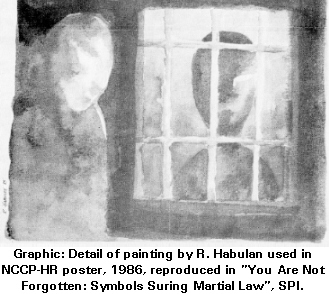KASAMA Vol. 14 No. 2 / April-May-June 2000 / Solidarity Philippines Australia Network
End Secrecy, Suffering and Fear in Saudi Arabia
Statement from the June 27, 2000 vigil at the Saudi Arabian Embassy, Makati City, Philippines
We gather with serious concern over the fate of those who have come under Saudi Arabia's judicial and administrative processes, especially its prisoners: immigrants, religious minorities and foreign workers. Foreign migrant workers comprise 60-80% of Saudi Arabia's workforce, and each faces a 100% risk of arbitrary arrests, detention, torture or execution.
Saudi Arabia's judicial system and legal procedures have come under considerable question because of their secrecy, inaccessibility, partiality and severity. Its courts, including judges, prosecutors, and religious police are gravely violative of universal human rights, especially the minimum standards of humane treatment for prisoners and detained persons. Families of prisoners have no means to communicate with, and assist their loved ones. Prisoners have no means by which they can avail of the best defense under the law. Remedies for miscarriage of justice are non-existent, especially for foreigners and religious minorities. Moreover, torture has been a standard practice to force the signing of confessions, often written in Arabic, which are totally incomprehensible to foreign prisoners. Daily hazards of psychological, physical and sexual abuse, particularly threaten women in Saudi prisons. Sadly, not even international diplomatic persuasion has made an impact on these practices.
Human rights groups such as Amnesty International have recorded a total of 767 executions over the past nine years, over half of which were migrant workers, whose nationalities were mostly Asian. Over 300 Filipino prisoners in Riyadh and Jeddah alone are suffering from fear, discrimination and illnesses. More than 20 face capital punishment. They have neither the Philippine government nor Saudi authorities to turn to for help.
Filipina domestic worker Sarah Jane Dematera's case highlights the serious flaws of the Saudi justice system. Dematera arrived in Saudi Arabia to start work in 1992. Four days later she was in jail, accused of murdering her female employer. Throughout her ordeal, Sarah is reported to have appeared before a judge in court only twice. Her trial remains shrouded in secrecy. She has no access to legal assistance. With no knowledge of Saudi Arabian's laws or Arabic, she could not have been able to mount an effective defense. The exact status of her sentence is not clear, but it appears that the death sentence will remain pending for approximately ten years until the youngest child of the murder victim reaches the age of eighteen and decides whether to accept compensation or ask for the execution to be carried out.

Saudi Arabia shares its record of worst human rights violator, with countries such as Pakistan, Afghanistan, China and the United States. It has not ratified the International Bill of Human Rights. It has not made significant steps to realize the human rights instruments which it ratified. It remains a dangerous country for women, Christians, Buddhists, Sikhs, and other ethnic minorities.
KAIBIGAN, KANLUNGAN, KAKAMMPI, PAHRA and other organizations participating in the campaign to End Secrecy, Suffering and Fear in Saudi Arabia have joined AMNESTY INTERNATIONAL in a global movement to establish a fair, impartial and humane justice system in the closed state. We call on the Saudi government to declare a moratorium on all executions, adopt mechanisms for fair and impartial trials, end discrimination of religious, racial and ethnic minorities, stop torture and forced confessions, adhere to internationally recognized legal procedures of criminal justice, ratify and enforce human rights among and within Saudi Arabian society.
Amnesty International-Pilipinas (AIP),
KAIBIGAN ng OCW, Inc. (KAIBIGAN),
KANLUNGAN Center Foundation,
Kapisanan ng mga Kamag-anak ng Migranteng Manggagawang
Pilipino (KAKAMMPI),
Philippine Alliance of Human Rights Advocates (PAHRA)
June 27, 2000
From: Kakammpi, 70-B Matahimik St,
Teacher's Village, Diliman, Quezon City 1101, Philippines.
Phone: +632 4354584
Fax: +632 9215810
Email: kakammpi@skyinet.net
Website: http://kakammpi.tripod.com
 Home | Aims and Objectives of Solidarity Philippines Australia Network | About Kasama
Home | Aims and Objectives of Solidarity Philippines Australia Network | About Kasama 
Search the SPAN Web